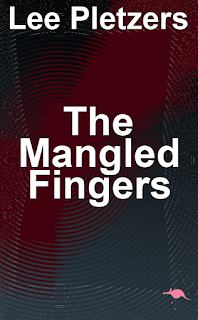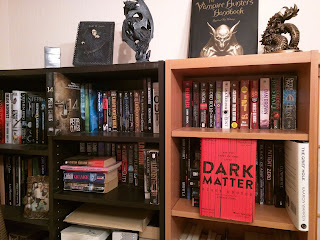I just watched this on Facebook, and it gets better the longer you watch. Hand clapping, knee slapping fun. For your pleasure, I have embedded it below.
Massive crack-up.

Till next time,

For a laugh I used a plot generator and it gave me this. With a bit of work, I could actually write this, with some changes of course.
Mangled fingers have been turning up all over Japan and the inhabitants are scared. Ten murders in ten weeks, all committed with a gun, and still nobody has a clue who the sinister killer is.
James Arron Ray is a beautiful and delightful police officer with a fondness for books. He doesn’t know it yet but he is the only one who can stop the callous killer.
When his girlfriend, Arisa Nishikawa, is kidnapped, James Ray finds himself thrown into the centre of the investigation. His only clue is a warped banana.
He enlists the help of a helpful psychiatrist called Saxton Middleton.
Can Middleton help Ray overcome his pain addiction and find the answers before the tactless killer and his deadly gun strike again?
LOL. It even gave me a cover.

They say writers need them or should use them. I’ve been using various forms of writing software since 2007. Before that I used MS Word. Wrote three novels and sold 50 short stories with just the word processor.
Times change. Now I use Scrivener and pretty much nothing else. Tho, I am old version. My old MacAir can’t handle more then 2 GB memory. Can’t upgrade. Stingy Apple. I still use it for writing. But, I am growing tired of old version of Scrivener and I have been looking around for other stuff.
(Image: Pexels.com Free stock images)
I’ll post my fav, a little later. First let’s look at some software.
Technology changes at a fast pace–or is the updates at a fast pace? Either way, I’ve found some cool new ways to write, especially on the go.
The software I’ll list is stuff I have used or purchased. No links. Sorry. If interested just highlight the software and right click search for… Works a charm. I could be like those Internet blogs that have affiliate links everywhere, but that’s not me.
First off (in no apparent order–just as I recall them):
yWriter — this was great writing software for the time. Made by a legacy published writer. Made for himself. He found it useful and offered it free on his site.A lot of writers used it. Not sure if it is still around. I still have version 5 on my computer. Not installed. It was great. It broke all chapters into scenes. And one would write their book, scene by scene.
Power Wtiter: This was expensive in 2006 $149 USD. But it looked brilliant. I wrote a could of novels on this software and I liked it a lot. I don’t remember too much about it tho. I do recall selling it three years later.
Zoho docs. Very nice word processor software, but that’s all it is. I liked it as it was online and I can access it from any machine. This is a big issue for me as I write on two machines, Mac and Win10.
oStorywriter — wouldn’t load. And when it did, the UI was not as friendly as I would have thought.
Darkwriter — Distraction free writing. Everything is blacked out but the writing space. It’s pretty decent and as long as you have headphones on, it is honestly distraction free. You don’t even realize your laptop battery is dying.
Pages — (Mac). A friend of mine writers all her novels on this word processor. I have only written short stories on it. Pages is nicer to write on than most processors. I don’t know why. It just feels good to use.
Bean — (Mac) a discontinued word processor. I loved it until I discovered Pages.
Scrivener — This is perhaps the most popular piece of writing software out there today. Originally, only for Mac the creators released a Windows version. I have only ever used the Mac. I’ve written two novels on this and several short stories.
Hemingway Writer: I used the free version and loved it. So, I paid $10 and got the full version plus a lifetime of updates. This software tells you if your sentence is too long, passive, has adverbs, or is difficult to read. It’s pretty decent software, especially for ten bucks.
Manuskript — is a great piece of software.
Celtx — I didn’t really like this way back in the day.
Now, there are a host of free software out there and one such site that lists most is: https://alternativeto.net/software/bibisco/
It is a brilliant site.
My fav is Scrivener. But I’m looking for cloud based solutions, so I can write anywhere on Laptop, Macbook, smart phone, etc.
But recently, I have discovered cloud writing. Google has this with a word processor. But it is only that and as I writer I like things to look writerly.
I have discovered: True Novelist. Very basic if going by the website. I think it is free.
Living Writer is a pay service. I feel more secure with a pay service: https://livingwriter.com/
The Quill, looks better. They are currently free as they work out a pay system: https://thequill.app/
Wordcradle is the best so far, but free freaks me out. http://www.wordcradle.com/
I’ll let you know which one I’ll use.
What do you write with?
As a gym rat, I stumbled on this and thought I’d share:

It all starts with an idea and they come at any time of any day and you can’t control it. You have no say in the matter, really. For me, ideas just pop into my head, as if my muse was chewing her pencil and a crack appeared in the fabric of space and time. From that crack, a slice of thought slipped out and my muse caught it.
A lot of people believe ideas are the product of the universe and some people (Dean Koontz?) can just grab them when they need. But adhering to this belief, one must assume thousands of other people also received the very same thought. Writers would plot around it; poets would create beauty from it; hundreds would do nothing with it. This is called the initial idea and it is the start of whatever you want to make of it.
My initial idea is to write a series of articles based on writing / learning the art of screenwriting. It is an area that interests me and has done for years. Only now do I have the opportunity to attempt it.
Screenwriters make 200,000 smackaroonies a year according to the Alliance of Motion Picture and Television Producers. A movie from a “known” scriptwriter can command anything from one million all the way up to four million. The six major film studios must pay a minimum of $106,000 for an original screenplay (according to the recently expired contract).
The above was discovered once I started studying screenwriting. Naturally to get the above movie sale, a writer is in a never-ending contest with a zillion other writers. And once you get the sale (if you are that lucky or your stars were in alignment with Mercury and interstellar solar particles), one can expect at least a dozen rewrites. Not all rewrites are done by you. But for 106 grand, I’d do it.![]()
Note: If you are really serious about screenwriting, get a copy of Final Draft. Yes it will cost you a few dollars and there is a reason for that: it is bloody good and does all the formatting for you. It has become the industry standard and even Stallone wrote his latest Rocky flick using this software. Find some way to get the money for it: beg on the street; busk; strike a pose; make a sign that reads: Starving Writer Needs Software; just don’t ask your folks, okay. That’s the easy way. If you earn it, then buy it, you’ll use it and master it. The software will have more value added to it instantly: Your sweat, blood and tears as you laid tar on the roads and dug trenches for pipes, would have all been worth it.
UPDATE: Writer duet is filpping fabulous: https://www.writerduet.com/ END OF UPDATE
The initial idea comes from many places. Some places are: A crack in the universe / hearing part of a conversation on the street, bus, train etc / experiencing life, café / workplace / a book, movie, TV show / stuck in traffic / newspaper or magazine headline or article / childhood memory / the moment before sleep claims you / dreams / a blank page (works for most people) / typing random words for a full thirty seconds and then reading what you wrote (this is an amazing technique; sometimes when you rearrange the words you have a complete sentence) / reading this article. (Side note: having written about the words on the page I had an image in my head of words swirling on the page and a middle age guy watching them and hearing words. They are telling him to “kill” — initial idea.)
Now we have the idea. Great! That was the easy part. What do you mean, the idea was hard? I look at a coffee cup and I wonder who made it. Where did they stand in the production line? Are they/he/she young or old or somewhere in-between? There are a lot of chemicals in a place like that. What if…?
There are a million, trillion, gazillion ideas out there, open your mind to them and you’ll never run dry. Now develop it, nurture it and help it grow.
(Put your characters through hell. My wife sometimes says, “I don’t like this now.” And pouts. This means she cares about what’s happening to the characters, but she still can’t turn away from the story. The outcome is just around the corner)
To help build and nurture that fantastic idea is to use some excellent software, like Freemind and it is fantastic for helping answer these questions and more, and it will help you construct a plot. This is the roadmap and Freemind can lay out the highways and side streets. It is a learning curve to master but simple once you get the hang of it. And you’ll wonder how you survived without it.
A novelist views the world in paragraphs. A screenwriter views the world in visual snapshots. The trick is to combine the two.